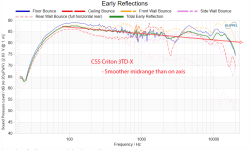From latest review on ASR
On the Klippel early reflections at 1M graph, why doesn't it show floor notch(s)?
Measurements from a 2 woofer 3way. Two woofers lower mounted (compared to stand mounted bookshelf) there will be some form of a cancellation so how does Klippel handle this?
On the Klippel early reflections at 1M graph, why doesn't it show floor notch(s)?
Measurements from a 2 woofer 3way. Two woofers lower mounted (compared to stand mounted bookshelf) there will be some form of a cancellation so how does Klippel handle this?
Attachments
Have you calculated the expected frequencies for the boost/cancellations? Is it showing response to a specific location or is it a power/average?
Some reasons it might be less distinct, and the reason those dimensions may be a factor.Two woofers lower mounted
Last edited:
A little unsure whether I understand your question, but the calculation of early reflections is taken from CTA-2034. Specifically, the floor reflections are calculated as the average of the -20, -30, and -40 degrees vertical response of the speaker. It does not account for interference effects from this reflection, as that would require knowing the listening position (distance and height) and woofer position(s).
My 2 woofer 3 way with 2 lower mounted woofers(very similar to OP) has two shallower notches (on axis at one meter) vs the deep notch measured from a stand mounted 2 way.
Thanks for the info!
The NFS data on early reflections would seem not as valuable as it could be as some(I believe) are using the data to determine in room response choices at listening position - Just a thought
Thanks for the info!
The NFS data on early reflections would seem not as valuable as it could be as some(I believe) are using the data to determine in room response choices at listening position - Just a thought
Last edited:
I'd agree. CTA-2034 seems more for rating pre-existing and commercial products. Some DIYers are apparently seeing the situation as something you get progressively more of the further you move from the speakers, like it's on a sliding scale. Certainly not the optimum way of designing a system.
